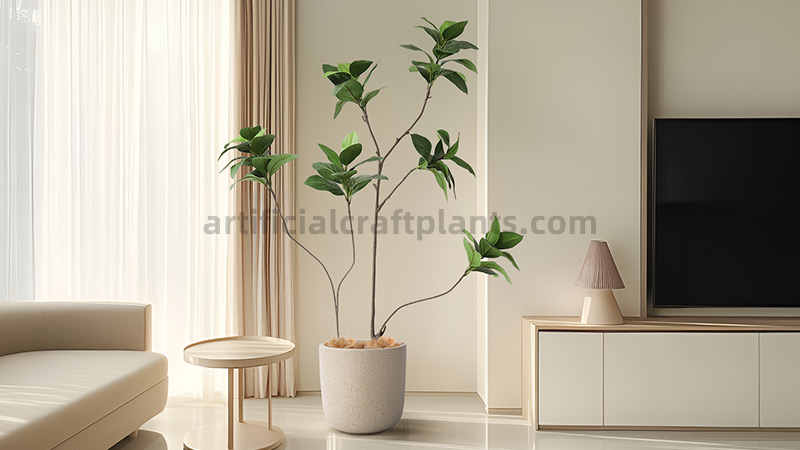In the competitive artificial plant industry, many B2B sellers find themselves caught in a price wars1 race to the bottom. While lowering prices might attract short-term buyers, it erodes profit margins and weakens brand value.
The key to long-term success lies in differentiation2—offering unique products, superior service, and strategic value that go beyond just pricing. Smart suppliers focus on quality, customization, branding, and innovative solutions to stand out in the global market.
Let’s explore actionable differentiation strategies that help artificial plant suppliers escape the price war and build a more profitable B2B business.
Why Competing on Price Alone is Unsustainable
Price competition might seem like a quick way to win orders, but it comes with significant drawbacks:
- Lower Profit Margins: Constant price reductions eat into earnings.
- Compromised Quality: Suppliers may cut corners to stay competitive.
- Weaker Brand Identity: Buyers see the business as a low-cost option rather than a premium provider.
- Customer Loyalty Erosion: Price-driven buyers switch to competitors offering slightly lower prices.
Instead of lowering prices, smart B2B exporters focus on value-driven differentiation.
5 Proven Strategies to Differentiate in the Artificial Plant B2B Market
1. Offer High-Quality3 Premium Artificial Plants
Problem: Many suppliers focus on low-cost, mass-produced artificial plants.
Agitation: Customers seeking premium products often struggle to find reliable suppliers.
Solution: Elevate quality standards and target high-end buyers.
How to Stand Out with Quality:
- Use real-touch PU materials instead of basic plastic.
- Offer UV-resistant & fire-retardant artificial plants for commercial use.
- Improve lifelike textures & handcrafted details.
- Provide certified quality control inspections (SGS, TUV, REACH).
Target Customers: Luxury hotels, high-end retailers, commercial designers.
2. Focus on Customization4 & OEM Services
Problem: Many buyers need unique designs but find limited customization options.
Agitation: Standardized products don’t fit specialized projects.
Solution: Offer flexible customization services for bulk orders.
Customization Options to Offer:
- Size & Shape: Tailor artificial trees and plants to client specifications.
- Material Selection: Provide different textures, colors, and finishes.
- Branding & Packaging: Private-label solutions for resellers.
- Bespoke Arrangements: Custom-built artificial plant walls, vertical gardens, and indoor landscaping solutions.
Target Customers: Architects, interior designers, retail chains, wholesalers.
3. Provide Exceptional After-Sales Support5
Problem: Many suppliers ignore post-sale service, leaving buyers frustrated.
Agitation: Lack of support leads to lost customers and bad reviews.
Solution: Build trust by offering responsive, value-added after-sales service.
Competitive After-Sales Advantages:
- Warranty Programs: 6-12 months coverage on defects.
- Installation & Care Guides: Video tutorials and troubleshooting support.
- Fast Replacement Policies: Efficient resolution for damaged goods.
- Dedicated Account Managers: Personalized service for B2B buyers.
Target Customers: Large distributors, commercial project managers, repeat buyers.
4. Sell Sustainable6 & Eco-Friendly Artificial Plants
Problem: Many businesses seek environmentally friendly décor but struggle to find suitable artificial plants.
Agitation: Standard plastic-based plants don’t align with sustainability goals.
Solution: Offer eco-conscious artificial plants that appeal to modern consumers.
Sustainable Differentiation:
- Use recycled plastics & biodegradable materials.
- Develop low-VOC, non-toxic artificial plants.
- Offer eco-certified products (REACH, RoHS compliant).
- Promote corporate sustainability initiatives in marketing.
Target Customers: Eco-conscious brands, LEED-certified buildings, green design firms.
5. Develop a Strong Brand7 & Marketing Strategy
Problem: Many suppliers focus only on product listings without building a recognizable brand.
Agitation: Buyers struggle to differentiate between suppliers with similar offerings.
Solution: Create a strong, trustworthy brand presence.
Branding Strategies for B2B Success:
- Professional Website & Catalogs – Showcase products with high-quality images and case studies.
- Social Media Engagement – Share projects, installations, and testimonials.
- Content Marketing – Publish blogs, industry insights, and artificial plant care guides.
- Client Testimonials & Case Studies – Highlight successful partnerships and real-world applications.
Target Customers: Importers, resellers, online marketplaces.
How to Implement These Strategies Successfully
Step 1: Identify Your Niche & Strengths
- Are you focusing on luxury, custom designs, or eco-friendly products?
- Who are your ideal customers, and what problems can you solve for them?
Step 2: Develop Differentiated Product Offerings
- Upgrade materials and improve product quality.
- Offer exclusive designs or OEM customization.
- Add sustainability features to attract eco-conscious buyers.
Step 3: Strengthen Service & Logistics
- Provide clear return & warranty policies.
- Improve response time & customer support.
- Partner with reliable freight forwarders for smooth deliveries.
Step 4: Invest in Digital & Trade Marketing
- Optimize for B2B marketplaces (Alibaba, Global Sources).
- Attend trade shows (Canton Fair, horticulture expos) to network with buyers.
- Use email marketing & social media to stay connected with leads.
Common Myths About Artificial Plant Differentiation
"Price is the only factor that matters in B2B sales."
Not true! Buyers prioritize quality, reliability, and long-term supplier relationships over the cheapest option.
"Customization is too expensive to implement."
Wrong! Offering small-scale customizations (logo branding, unique packaging, or slight design variations) adds value without major cost increases.
"Only luxury buyers care about sustainability."
False! Many corporate clients and retailers prefer eco-friendly products due to regulations and brand reputation concerns.
Conclusion
Breaking free from price wars requires differentiation through quality, customization, service, sustainability, and branding. B2B artificial plant suppliers who focus on unique value propositions instead of undercutting prices can build long-term business success, increase customer loyalty, and boost profit margins. The future belongs to those who stand out—not those who race to the bottom.
--
-
Explanation: Links to a Harvard Business Review article discussing strategies to handle price wars, providing expert insights for B2B sellers. ↩
-
Explanation: Connects to a PMGCO article on B2B differentiation, offering six primary strategies relevant to the artificial plant market. ↩
-
Explanation: Refers to a Designer Plants blog comparing high- vs. low-quality artificial plants, emphasizing quality's role in differentiation. ↩
-
Explanation: Points to an Artificial Plants Supplier page showcasing customization options, supporting the customization strategy. ↩
-
Explanation: Links to a Market Research Future report on the artificial plants market, highlighting after-sales support importance. ↩
-
Explanation: Directs to Bloomist’s eco-friendly faux botanicals page, illustrating sustainable artificial plant offerings. ↩
-
Explanation: Connects to Nearly Natural’s website, a leading brand example in the artificial plant industry for strong branding. ↩

Hello everyone, I'm Li!By day, I'm a seasoned expert in the artificial plant industry, starting from the factory floor and working my way up to running my own successful business. In my free time, I’m passionate about running and often join trail runs with friends.Here to share what I've learned—let's grow together!



